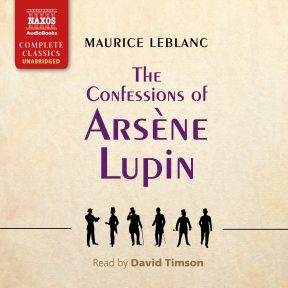The NAB Blog
Arsène Lupin – Gentleman or Rogue?
By Anthony Anderson
21 February 2023
 The first Arsène Lupin story appeared in the periodical Je Sais Tout in 1905, 14 years after the publication in The Strand of the first Sherlock Holmes story, A Scandal in Bohemia. The editor of Je Sais Tout, Pierre Lafitte, had asked the writer Maurice Leblanc to write an adventure story along the same lines as Conan Doyle’s, and thus The Arrest of Arsène Lupin was published. Encouraged by the instant and positive reception, Lafitte asked for more stories. Leblanc was initially reluctant – after all, Lupin had been arrested – but was persuaded by Lafitte, who argued that ‘Lupin is worth saving.’ Leblanc then contrived a means by which his hero escaped prison, and further stories followed, the first nine of which were published in a collection called Arsène Lupin, Gentleman-Burglar. The stories continued to be popular, both in the original French, but also around the world in their many translations. Inevitably, theatrical and film versions followed and, in recent years, a successful Netflix series based on the Leblanc texts has appeared.
The first Arsène Lupin story appeared in the periodical Je Sais Tout in 1905, 14 years after the publication in The Strand of the first Sherlock Holmes story, A Scandal in Bohemia. The editor of Je Sais Tout, Pierre Lafitte, had asked the writer Maurice Leblanc to write an adventure story along the same lines as Conan Doyle’s, and thus The Arrest of Arsène Lupin was published. Encouraged by the instant and positive reception, Lafitte asked for more stories. Leblanc was initially reluctant – after all, Lupin had been arrested – but was persuaded by Lafitte, who argued that ‘Lupin is worth saving.’ Leblanc then contrived a means by which his hero escaped prison, and further stories followed, the first nine of which were published in a collection called Arsène Lupin, Gentleman-Burglar. The stories continued to be popular, both in the original French, but also around the world in their many translations. Inevitably, theatrical and film versions followed and, in recent years, a successful Netflix series based on the Leblanc texts has appeared.
As may be expected from a character who both commits and solves crimes, Lupin himself is nothing if not multi-faceted. Although he is a con man and thief, the dispossessed have nothing to fear from him – they often benefit from his kindness. In the spirit of Robin Hood, he often taunts both his victims and the police. His sophisticated roguery brings to mind Hornung’s Raffles or Chesterton’s Flambeau, while his wit recalls Sherlock Holmes, whom he outwits in Arsène Lupin versus Herlock Sholmes.
But the style and tone of the Lupin stories differs markedly from those of Conan Doyle. They are full of an obvious humour which sits alongside the mystery and sometimes danger. Otto Penzler, the American writer described Lupin as follows:
‘A brilliant rogue, he pursues his career with carefree élan, mocking the law for the sheer joy of it, rather than for purely personal gain. Young, handsome, brave and quick-witted, he has a joie de vivre uniquely and recognisably French. His sense of humour and conceit make life difficult for the police, who attribute most of the major crimes in France to him and his gang of ruffians and urchins.’
Unlike Conan Doyle, whose narrator is always the loyal Dr Watson, Leblanc uses different narrators to progress his narrative. Sometimes this is a neutral third-person storyteller, and sometimes it’s a devoted admirer or Lupin himself. Regardless of the narrative perspective, these stories are brought to life with wit and sparkle in our audiobooks by acclaimed actor David Timson and are, above all, great fun.
« Previous entry • Latest Entry • The NAB Blog Archive • Next entry »